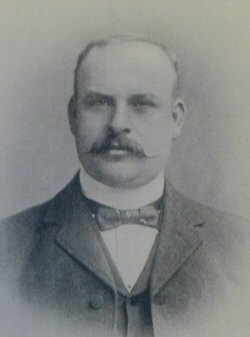 THOMAS
PAXTON
THOMAS
PAXTONTHE proprietor of the New Century Hotel was born in the village of Letham, near Cupar-Fife, in 1860, and came to Glasgow at the age of sixteen with less than the halfcrown of the legend in his pocket. On his three, and twentieth birthday he was appointed a detective officer in the Central Division of Glasgow City Police.
Finding small scope for his energies in that position, however, he in 1886 applied for and obtained the post of Manager of the City Improvement Trust Lodging-house in Gorbals. So successful was his management there that the establishment was nearly doubled in size under his rule. He became known as a leader of the movement for the housing of the working classes. Lord Rowton paid his establishment a visit and invited him to London to see the similar work there. While in the capital he discussed with General Booth the question of Metropolitan shelters for the poor, prior to the launching of the "Darkest England" scheme, and he was invited and urged to take charge of the lodging-house scheme of the London County Council.
This appointment he refused, and in 1895, giving up his appointment under the City Improvement Trust, he proceeded to found three large Model Lodging-Houses of his own. These are Carlton House, Gorbals, Rutland House, Plantation, and the Trades' Hotel, Clydebank. They are the only houses of the kind in which cookedfood is supplied to the occupants, and so great has been the success of their general arrangements that at the New York Health Exhibition of 1900 their plans and methods were exhibited as models by Mr. Laurance Veiller, Secretary of the Tenement House Committee of the New York Charity Organisation Society.
Mr. Paxton next attacked the problem of a hotel for the artisan, and the result was his New Century Hotel in Holm Street. This new departure in cheap housing, "a halfway house between the model lodging and the west-end palace hotel," was opened by Lord Provost Chisholm at a dinner presided over by Mr. J. G. A. Baird, M.P., in April, 1901. It was the eve of Glasgow International Exhibition, and forthwith the house was filled to overflowing from basement to roof. It is fireproof, rat-proof, and plague-proof, contains four hundred bedrooms, and offers, among its amenities, bathrooms, lavatories, writing rooms, billiard rooms, students' rooms, and lifts to all floors. All this it offers with board and lodging, for 12s. 6d. per week, or with lodging, but without board, for 4s. or 4s. 9d. per week. Within the last few years, for the more efficient supplying of his boarders, Mr. Paxton has instituted stores whence supplies of all kinds are sent to his various establishments. These stores themselves bake all bread, manufacture all kinds of mineral water, and slaughter their own cattle and sheep. Altogether, by his vast organisation Mr. Paxton has gone farther perhaps than anyone to solve the problem of the housing of the working man.
In addition to these enterprises he has taken a considerable interest in public affairs. He has represented the ninth or Blackfriars' Ward in the Glasgow Town Council for the last four years, and was returned unopposed for the same ward for another term in 1907. As a Town Councillor he has taken a very active interest in the Committees on Health, Gas, City Improvements, Sewage, Libraries, Watching and Lighting, and Building Regulations, and is Convener of the Committee on Public Halls. He has also represented the Gorbals Ward in Govan Parish Council, has been a member of Govan District Lunacy Board and the Joint Committee of the Lanarkshire and Govan District Boards, and he has been President of the Glasgow Southern Merchants' and Tradesmen's Society and of the Glasgow and District Burns' Bowling Association. He is a burgess of the city, a member of the Incorporation of Wrights, and Vice-President of the Fife, Kinross, and Clackmannan Charitable Society. He is a member of the Perthshire Charitable Society and of the Barony of Gorbals Benevolent Society. He has also been President of the Haggis Burns' Club, and was President of the Kingston Bowling Club, Pollokshields, during its great Jubilee Tournament in 1899.